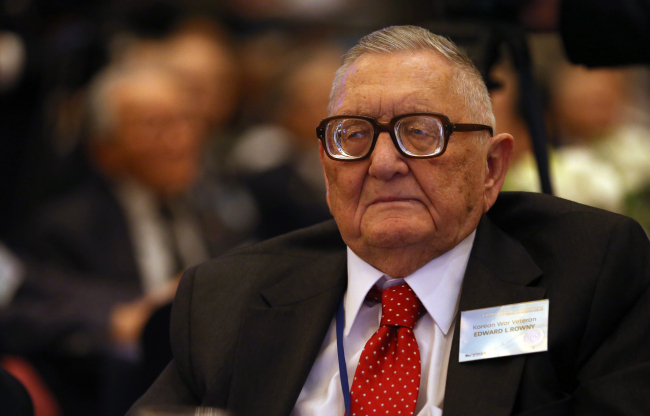‘Freedom comes with a price,’ says U.S. Korean War veteran
By Korea HeraldPublished : June 25, 2013 - 19:46
Edward Rowny, a retired U.S. Army general, says that if he learned anything from the Korean War, it is that “Freedom comes with a price.”
Rowny, now 96, still recalls the days when he worked as a spokesman for U.S. Gen. Douglas MacArthur, the commander of the Allied Forces which fought against invading North Korean troops during the three-year war.
Rowny said MacArthur had to overcome opposition from more cautious U.S. generals to push through with the risky Incheon landing that turned the tide of war. The bold maneuver allowed Allied Forces to recapture Seoul five days later.
“It allowed President Syngman Rhee back to Seoul,” Rowny said, referring to the inaugural South Korean president who fled the capital city days after Soviet tank-led North Korean troops stormed across the 38th parallel on June 25, 1950. “I was very happy, and Rhee was happy.”
Rowny, now 96, still recalls the days when he worked as a spokesman for U.S. Gen. Douglas MacArthur, the commander of the Allied Forces which fought against invading North Korean troops during the three-year war.
Rowny said MacArthur had to overcome opposition from more cautious U.S. generals to push through with the risky Incheon landing that turned the tide of war. The bold maneuver allowed Allied Forces to recapture Seoul five days later.
“It allowed President Syngman Rhee back to Seoul,” Rowny said, referring to the inaugural South Korean president who fled the capital city days after Soviet tank-led North Korean troops stormed across the 38th parallel on June 25, 1950. “I was very happy, and Rhee was happy.”

Rowny said he got involved in the historic Incheon landing operation from its planning stage.
As South Korea commemorates the 60th anniversary of the signing of the armistice agreement that ended hostilities, Rowny got on a long flight to Seoul to attend an event hosted by the South Korean Ministry of Patriots and Veterans Affairs along with other veterans from 21 U.N. allied nations.
“I’m very happy to come back to Korea in the 60th anniversary of the signing of the armistice,” Rowny told reporters after a welcoming event in Seoul.
Korean hosts arranged the event to express thanks to Rowny and other foreign veterans for their service and sacrifice during the war and show them how the war-ravaged country transformed into an economic powerhouse.
A former U.S. chief negotiator for arms reduction talks with the Soviet Union in the 1980s, Rowny said he is happy that South Korea has grown enough to defend itself and maintains strong alliance with its strategic partner, the U.S.
“You have to defend your country. It’s very important to do that,” he said.
During U.S. President Ronald Reagan’s first term in the 1980s, Rowny served as the chief negotiator for the Strategic Arms Reduction Talks (START) and was later awarded the Citizens Medal for being one of the “chief architects” for “Peace Through Strength.”
Since retiring from active duty, Rowny has continued to act as an adviser for national security and homeland defense as well as engage in philanthropic activities.
Since the end of the Korean War, the general has made a dozen visits to South Korea and witnessed visible progress every time.
The key to South Korea’s economic miracle, he believes, lies in their passion to educate and train talented people and persevere through obstacles.
“Brains. Nothing’s better than using your brain,” he said.
To maintain the freedom and prosperity that South Koreans enjoy today, Rowny said people should remember the sacrifices made by older generations and not be complacent.
“Freedom doesn’t come cheap. It doesn’t come easy. It doesn’t come free,” Rowny said. “You have to be ready to nurture liberty with own blood.”
To defend freedom, the former Army general said South Korea should maintain strong ties with the U.S. to counter continuing North Korean threats.
“Stay strong and stay close to your friends to defend against (the) enemy,” he said.
After a long day of events, the white-haired veteran gladly played traditional Korean folk song “Arirang” with his harmonica, a song he learned shortly after he landed on the eastern port city of Incheon for the historic battle.
For him, “Arirang” is the song Koreans sang while they were fleeing in the winter of 1950 when North Koreans launched counterattacks with the help of China against U.N. forces trapped in the perimeter of Heungnam, a major port on the North’s east coast.
“People stayed close together, and they were singing this song,” he recalled the Christmas Eve of 1950 when about 100,000 Allied troops and 100,000 civilians were loaded onto merchant ships and military vehicles to flee southward to Busan and other destinations in South Korea.
“I’m happy to play it 60 years after.” (Yonhap News)
-
Articles by Korea Herald











![[Hello India] Hyundai Motor vows to boost 'clean mobility' in India](http://res.heraldm.com/phpwas/restmb_idxmake.php?idx=644&simg=/content/image/2024/04/25/20240425050672_0.jpg&u=)








